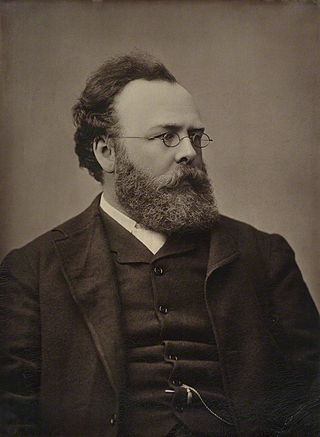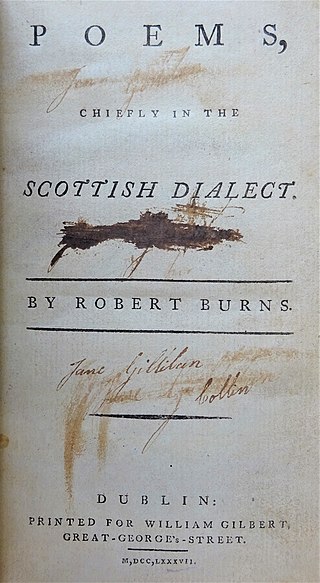
Sir Walter Scott, 1st Baronet, was a Scottish novelist, poet and historian. Many of his works remain classics of European and Scottish literature, notably the novels Ivanhoe (1819), Rob Roy (1817), Waverley (1814), Old Mortality (1816), The Heart of Mid-Lothian (1818), and The Bride of Lammermoor (1819), along with the narrative poems Marmion (1808) and The Lady of the Lake (1810). He had a major impact on European and American literature.
This article contains information about the literary events and publications of 1827.

Robert Fergusson was a Scottish poet. After formal education at the University of St Andrews, Fergusson led a bohemian life in Edinburgh, the city of his birth, then at the height of intellectual and cultural ferment as part of the Scottish Enlightenment. Many of his extant poems were printed from 1771 onwards in Walter Ruddiman's Weekly Magazine, and a collected works was first published early in 1773. Despite a short life, his career was highly influential, especially through its impact on Robert Burns. He wrote both Scottish English and the Scots language, and it is his vivid and masterly writing in the latter leid for which he is principally acclaimed.

Alexander Wilson was a Scottish-American poet, ornithologist, naturalist, and illustrator. Identified by George Ord as the "Father of American Ornithology", Wilson is regarded as the greatest American ornithologist before Audubon.

Robert Tannahill was a Scottish poet of labouring class origin. Known as the 'Weaver Poet', he wrote poetry in English and lyrics in Scots in the wake of Robert Burns.

Robert Williams Buchanan was a Scottish poet, novelist and dramatist.

Robert Pollok was a Scottish poet best known for his work, The Course of Time, published in the year of his death.

The Birds of America is a book by naturalist and painter John James Audubon, containing illustrations of a wide variety of birds of the United States. It was first published as a series in sections between 1827 and 1838, in Edinburgh and London. Not all of the specimens illustrated in the work were collected by Audubon himself; some were sent to him by John Kirk Townsend, who had collected them on Nathaniel Jarvis Wyeth's 1834 expedition with Thomas Nuttall.
Nationality words link to articles with information on the nation's poetry or literature.

Tamerlane and Other Poems is the first published work by American writer Edgar Allan Poe. The short collection of poems was first published in 1827. Today, it is believed only 12 copies of the collection still exist.
John Struthers was a Scottish poet and miscellaneous writer.

The bibliography of Herman Melville includes magazine articles, book reviews, other occasional writings, and 15 books. Of these, seven books were published between 1846 and 1853, seven more between 1853 and 1891, and one in 1924. Melville was 26 when his first book was published, and his last book was not released until 33 years after his death. At the time of his death he was on the verge of completing the manuscript for his first novel in three decades, Billy Budd, and had accumulated several large folders of unpublished verse.
Events from the year 1827 in Scotland.
Josiah Walker (1761–1831) was a Scottish writer, from 1815 Professor of Humanity at Glasgow University. He is known as a biographer of Robert Burns.

Poems, Chiefly in the Scottish Dialect is commonly known as the first Edinburgh Edition and the partial second setting has become known as the Stinking Edition. It is a collection of poetry and songs by Robert Burns, first "Printed for the Author" by William Smellie in Edinburgh and published or "Sold by William Creech" of Edinburgh on the 17 April, an announcement being made in the Edinburgh Advertiser on that date, although the date 21 April 1786 is given by a few authors. The Kilmarnock Edition made Robert Burns Caledonia's Bard whilst the 'Edinburgh Edition' elevated him into a position amongst the world's greatest poets.

The Merry Muses of Caledonia is a collection of bawdy songs said to have been collected or written by Robert Burns, the 18th-century Scottish poet.

James M'Kie or James McKie (1816–1891) was an apprentice of Hugh Crawford, John Wilson's successor at the Kilmarnock Cross printing business. In 1867, M'Kie published the first facsimile edition of the 1786 "Kilmarnock Edition" or Poems, Chiefly in the Scottish Dialect as well as various bibliographies, reprints, special editions, limited editions, etc. of Robert Burns' and other works for the Scottish, British, British Empire or North American markets. He became an avid collector of Burnsiana and put together the largest collection of published in the world at the time, that was eventually purchased by the local Kilmarnock Corporation and housed in the Kay Park Burns Museum.

Edward Whigham (1750–1823) was the landlord of a coaching inn, a bailie, Provost of Sanquhar, bibliophile and one of Robert Burns's close friends during his Nithsdale and Dumfries days. Edward married Jane Osborne.

Poems, Chiefly in the Scottish Dialect was the second "pirated" issue of Robert Burns's work, being published in Ireland at Belfast without permission from or payment to the author or publisher. It is a so-called Stinking Edition, carrying the error Stinking for the Scots word Skinking (watery) in the poem "To a Haggis" because the type setters copied from a 1787 Stinking Edition of Poems, Chiefly in the Scottish Dialect. It has been shown to be from the same print setting as the Belfast Edition but with a different title page.

Poems, Chiefly in the Scottish Dialect was a 'pirated' edition of Robert Burns's work, being published in Ireland without permission from or payment to the author or publisher. It is a so-called 'Stinking Edition', carrying the error 'Stinking' for the Scots word 'Skinking' (watery) in the poem "To a Haggis" because the type setters copied from a 1787 'Stinking Edition' of Poems, Chiefly in the Scottish Dialect .















